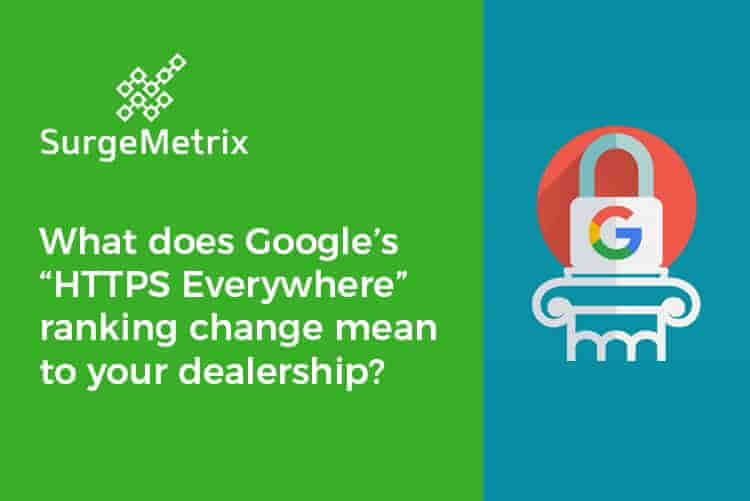Google uses over 200 factors to determine website relevancy , and now HTTPS has been thrown into the mix, with a rule that Google is calling “HTTPS Everywhere.”
From keyword relevance and backlinks to social shares and web page loading time, Google uses its ranking signals to determine which web sites rise and which ones fall in the search results. Some signals carry more weight than others, and Google has hinted that HTTPS may become stronger than it is now.
HTTPS is Everywhere
HTTPS stands for Hypertext Transfer Protocol Secure and is a communications protocol for secure communication over a computer network. Websites that use HTTPS transport data by means of the SSL/TSL protocol. These protocols encrypt data that is transported between a user and a website, and protect against common types of security breaches, such as man-in-the-middle attacks.
A number of years back, Google called for worldwide adoption of HTTPS as the new web protocol standard. The search giant has long been a supporter of HTTPS, which is implemented by default for Gmail and Google Docs. Perhaps in an effort to further their agenda for a secure web, Google began testing HTTPS in their search ranking algorithms and then made it part of their everyday business.
HTTPS Plays a Role in Search Rankings
Google states that “security is a top priority” for Google and while currently HTTPS is only a “lightweight” signal that affects less than 1% of queries, “over time, we may decide to strengthen it, because we’d like to encourage all website owners to switch from HTTP to HTTPS to keep everyone safe on the web.”
Most major websites support HTTPS, from Facebook to Twitter, Paypal, Amazon, and Wikipedia, which enable HTTPS by default. There is even a web browser extension called HTTPS Everywhere, developed by the Electronic Frontier Foundation and the Tor project. This extension forces HTTPS implementation on websites that support the protocol.
Given the widespread push for this encryption protocol, it seems pretty clear that HTTPS is on its way to becoming the norm. If, or when it does, this will mean that your dealership website will probably have to adjust and adopt HTTPS to secure its ranking position against other competitor’s sites that use HTTPS.
What Could HTTPS Everywhere Mean for Your Dealerership’s Search Rankings?
How seriously do you take your SEO? As a dealer, I expect that it is VERY important to you.
Let’s look at what happens when you run a standard SSL test on a website without SSL as an emulation of how Google might view non-SSL sites. At random, I picked an insecure website – which shall remain nameless – and first tried connecting with the HTTPS protocol. Firefox informed me that the certificate was untrusted, so I clicked the “Get me out of here!” button. I then did an SSL test using Qualys Labs’ SSL Test, a tool which runs a deep analysis of a site’s security. The news was not good. If this were your dealership’s site being visited by a potential car buyer, they would have discovered that the certificate was untrusted and probably would have gone shopping elsewhere.
With HTTPS Everywhere as a ranking signal, this website would might get knocked below a competitor that uses up-to-date security protocols. You want to be the dealer with a proper HTTPS Everywhere configuration.
You can find HTTPS Everywhere information from Google here, but just know that they encourage the following:
- 2048-bit key encryption
- Not blocking crawlers with robots.txt
- Avoidance of the no index meta tag
- Using relative URLs for resources on the same domain
- Using protocol-relative URLs for other domains
Some webmasters may be concerned about performance, since encryption introduces additional computational costs. These, in turn, can affect the websites performance and usability, which adds an entirely new dimension to the problem. There are also administrative hassles of setting up SSL. The widespread effort to increase web security is commendable, but how will it affect your dealership website and your ranking?
My advice? Never panic with Google. Just keep an eye peeled for changes and adapt as things move forward.
[This article was reposted from a number of years ago.]
